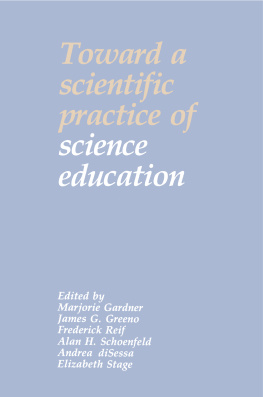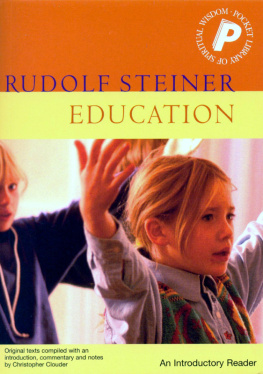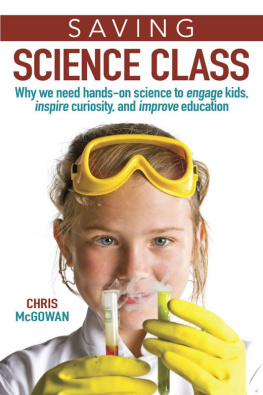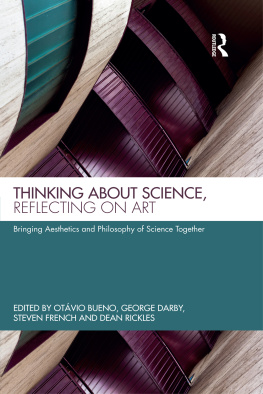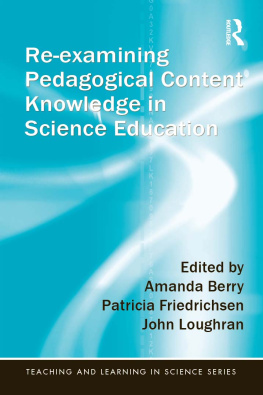TOWARD A SCIENTIFIC PRACTICE OF SCIENCE EDUCATION
Toward a Scientific Practice of Science Education
Edited by
Marjorie Gardner
University of California, Berkeley
James G. Greeno
Stanford University
Institute for Research on Learning
Frederick Reif
Alan H. Schoenfeld
Andrea Disessa
Elizabeth Stage
University of California, Berkeley
First Published by
Lawrence Erlbaum Associates, Inc., Publishers
365 Broadway
Hillsdale, New Jersey 07642
Transferred to Digital Printing 2009
by Routledge
270 Madison Ave, New York NY 10016
2 Park Square, Milton Park, Abingdon, Oxon, OX14 4RN
Copyright 1990 by Lawrence Erlbaum Associates, Inc.
All rights reserved. No part of this book may be reproduced in any form, by photostat, microfilm, retrieval system, or any other means, without the prior written permission of the publisher.
Library of Congress Card Number 90-3867
ISBN 0-8058-0345-9
Publisher's Note
The publisher has gone to great lengths to ensure the quality of this reprint but points out that some imperfections in the original may be apparent.
Contents
| Marjorie Gardner and Elizabeth Stage |
| Lillian C. McDermott |
| J. Dudley Herron |
| Jim Stewart |
| Jack Lochhead |
| Frederick Reif |
| Frederick Reif |
| Ann L. Brown and Joseph C. Campione |
| William J. Clancy and Kurt Joeger |
| Jill H. Larkin, Carol Sheftic, and Ruth W. Chabay |
| James G. Greeno |
| Denis Newman |
| Penelope Eckert |
| Geoffrey B. Saxe |
| Vincent N. Lunetta |
| Jean Lave |
| Alan H. Schoenfeld and Andrea DiSessa |
| David L. Goodstein |
| Alan H. Schoenfeld |
| Andrea A. DiSessa |
| Marcia C. Linn |
James G. Greeno
Stanford University and Institute for Research on Learning
Marjorie Gardner
Lawrence Hall of Science, University of California, Berkeley
This book reflects a vision of a field that is in the process of development. We believe that a revised and advanced field of science education can emerge from the convergence and synthesis of several current scientific and technological activities. This book includes some examples of research progress of the kind that we hope will form the integrated discipline of science education.
The papers in this volume were presented at a conference that was an effort toward this revision and advancement. At a previous meeting in 1986, members of the communities of science educators, cognitive scientists, and educational technologists met to discuss and formulate a research agenda for science education. In addition to a report of the group's conclusions (), the meeting accomplished a step toward forming an inclusive community of research and development for science education.
The participants in the 1986 meeting agreed that there is an important agenda for research in science education and that the communities of science educators, science-education researchers, cognitive scientists, and technologists bring important perspectives and capabilities to that scientific activity. They did not completely agree on every point that should be on the agenda or on the relative importance of the points, but that is as it should be. The community should not try to work in a single-minded way, but rather should pursue a collection of overlapping but nonidentical goals and thereby discover which directions are most productive. The shared sense of the group, however, was that important programs of research and development are being pursued, and that some of the community's effort should be directed toward bringing these various activities into closer contact. This led to our decision, along with our colleagues, to hold a conference in 1988, at which the papers in this volume were presented. We invited individuals working on the social context of science learning, in addition to technology, cognitive science, and science education researchers.
The conference that this volume presents was, in part, a test of the hypothesis developed at the 1986 meeting, namely, that there is an important agenda for research in science education and that the various communities of researchers are engaged in work that is significant for the development of a new integrated field. We decided to test this hypothesis directly by bringing together individuals from the various communities to present their work and encourage discussion among the participants.
The first condition for developing a new intellectual field is the existence of research problems that are productive and about which the community can interact meaningfully. We believe that this condition is met, and we present this book as our evidence. These are not the only examples of work that would be synthesized in the field of science education; any meeting represents a partial sample. But the point we wish to make is that significant examples exist, and we hope that our colleagues agree that these papers definitely establish that.
Another condition for developing this field is that individuals working in its various subcommunities interact productively about each other's problems as well as their own. This is harder to demonstrate in a volume of research papers, but on the basis of our experience in the two meetings, we are optimistic about that as well. The discussions were mutually engaging and spirited, and participants' comments about the meetings were positive. Many individuals at the meetings met each other for the first time and apparently were favorably impressed. Most of the final versions of papers that you can read here differ significantly from the versions that were presented, reflecting comments and questions that were given by other participants. The shared sense of engagement, including agreements as well as significant unresolved issues, is reflected in the summary section that Linn contributed to this book. The development of a genuine scientific community is a long-term process, of course, but we see the success of these meetings as a positive sign.
Organization of the Book
The papers in this book are in four sections, reflecting four research traditions that we feel can come together in a scientific practice of science education.
First, there is a community of science-education researchers whose intellectual homes are in the study of curriculum and teaching of scientific disciplines. Discipline-based research and development was the main activity of the science-education field during the important period of curriculum reform in the 1950s and 1960s and continues to play a major role.
A second community of researchers in cognitive science studies general principles of learning, knowing, understanding, and reasoning. Cognitive science is, itself, a field in the process of development, forming as a convergence of parts of artificial intelligence, cognitive psychology, linguistics, philosophy, and other disciplines. The research in this developing field differs from earlier research, especially in psychology, in a way that is important for science education. Modern cognitive science attends to the content of information that people learn, know, understand, and reason with. Earlier research on cognition was abstract and content-free; however, in cognitive science beginning in the late 1950s, simulation models of cognitive structures and processes include hypotheses about the specific information structures that are known and understood and the specific reasoning operations that are applied to those structures.

